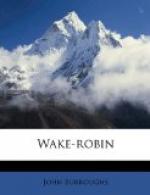A month later, March 4th, is this note:—
“After the second memorable inaguration of President Lincoln, took my first trip of the season. The afternoon was very clear and warm,—real vernal sunshine at last, though the wind roared like a lion over the woods. It seemed novel enough to find within two miles of the White House a simple woodsman chopping away as if no President was being inaugurated! Some puppies, snugly nestled in the cavity of an old hollow tree, he said, belonged to a wild dog. I imagine I saw the ‘wild dog,’ on the other side of Rock Creek, in a great state of grief and trepidation, running up and down, crying and yelping, and looking wistfully over the swollen flood, which the poor thing had not the courage to brave. This day, for the first time, I heard the song of the Canada sparrow, a soft, sweet note, almost running into a warble. Saw a small, black velvety butterfly with a yellow border to its wings. Under a warm bank found two flowers of the houstonia in bloom. Saw frogs’ spawn near Piny Branch, and heard the hyla.”
Among the first birds that make their appearance in Washington is the crow blackbird. He may come any time after the 1st of March. The birds congregate in large flocks, and frequent groves and parks, alternately swarming in the treetops and filling the air with their sharp jangle, and alighting on the ground in quest of food, their polished coats glistening in the sun from very blackness as they walk about. There is evidently some music in the soul of this bird at this season, though he makes a sad failure in getting it out. His voice always sounds as if he were laboring under a severe attack of influenza, though a large flock of them, heard at a distance on a bright afternoon of early spring, produce an effect not unpleasing. The air is filled with crackling, splintering, spurting, semi-musical sounds, which are like pepper and salt to the ear.




